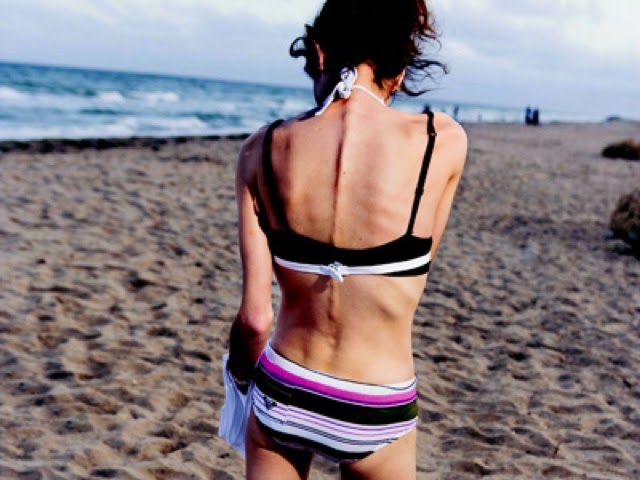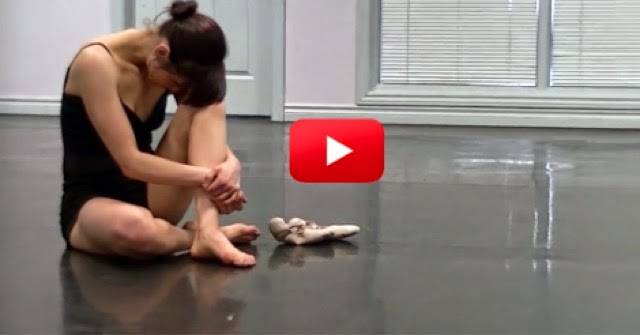
Lauren Greenfield/VII
It was in the eighth grade — four years after my mother died — that I first remember becoming unhappy with my body. Every night, after brushing my teeth and squeezing some blackheads, I'd look in the mirror and pound on my abdomen with my fists. Although I know now that it was just an early sign of puberty, I was disgusted by the way my belly had begun to protrude under the band of my underwear. So I got the idea to make it disappear by losing five pounds, then 10, and then 15. Pretty soon I was addicted to losing.
It's a control thing, doctors say, and in my case that was all too true: I needed to organize a world that had been thrown into chaos after my mother died. Her death had come as a complete shock to me; she'd never told me she had cancer, or that she was dying. And with her sudden disappearance, all the things that I'd trusted as absolutes — all the other foundations of my life — began to crumble.
I couldn't believe in God anymore, not when I'd been such an incredibly dedicated little Catholic and all I got in return was a vicious punishment. What kind of system was that? I couldn't believe in my earthly father, a construction-working Irish immigrant who'd become angry, depressed, and dysfunctional — a sad version of the charismatic and fun-loving dad I once knew. I couldn't believe in my own worth anymore, either. Catholicism had set some deep grooves in my soul, and even if I'd rationally given up on God, it was impossible to free myself from the magical thinking that goes along with religious zealotry: Deep down, I thought I must be damned if my mother had been taken away from me. Flawed, cursed, worthless. That was me.
Dieting became a way of imposing an external value system on my flesh: If I could control myself enough to lose another pound, I was that much closer to good. I hoped I could redeem myself.
That Fall, I started my freshman year at an all-girls Catholic high school, and kept chiseling away at myself, trying to purify my soul through the transformation of my body. By October, I was subsisting on almost nothing — about 250 calories a day. I'm amazed I had the energy to get up and go to school every day, let alone keep up with varsity soccer practice. But despite how uncomfortable my body was — I was exhausted and freezing because I had no body fat — my mind felt better than ever. If dieting was my new religion, I was on my way to becoming a saint.
The skinnier I got, the harder it was to keep the adults around me from noticing, although I did everything I could to hide my body. I'd spend lunch hour in the library. I'd change for soccer practice in the bathroom, instead of in the locker room with everyone else. I'd wear extra layers under my school uniform and baggy clothes at home — not that they did much to quell my father's growing suspicions.
He and I seemed to do nothing but scream at each other. Our fights almost always reduced me to sobs — which just induced him to get louder. "Why are you crying? I wish I could cry," he'd taunt. "But what would happen to us if I lay down and cried? This family would fall apart!" I'd despise myself for being a baby, but the more I hated myself, the harder it was to stop my tears.
Our fights often began over the news headlines, like abortion and capital punishment. On the surface, those clashes were political: I was a budding liberal and he was a Reagan-loving Republican. But I think I was also arguing that I deserved to have control over my body, and by extension, my mind. I wanted to be free of that miserable house, and the deadly gloom that had descended on it, and my own depression.
As I continued to wither, my father kept on shouting, but he also began to cajole. "Please eat," he'd say. "For me? A little food's not going to hurt you." As satisfying as it was to hear him plead, the better pleasure was knowing that I finally had the power I wanted — over my body, and over him.
So I stopped caring about what he thought, focusing instead on living up to my own standards of starvation. As long as I concentrated on them, I didn't have time to dwell on anything else — not when my head was so full of caloric calculations, and my body so empty.
By November, things started happening that I couldn't cover up with clothes or lies. My feet had gotten so thin that my soccer cleats had cut holes into the skin around my ankles; after several weeks, the resulting sores got so bad that I started to hobble. One day, when I could barely walk, my coach called me over. "You look terrible out there — like a drunk with two broken feet," she said, forcing a laugh. "What's going on?"
I made some excuse, but she had me sit out the rest of practice.
When I got home that afternoon, my coach had left a message for my father on our answering machine. "Could you please call me as soon as you can?" her recorded voice said. I erased it.
The next morning, when I tried to get up from my desk after Spanish class, I collapsed. The nun who was my teacher peeled me off the floor, and with her help, I was able to stand, then limp, but it seemed clear my left leg was paralyzed from the knee down. My father took me to my pediatrician, who told me I was so bony that I'd pinched an important nerve simply by crossing my right leg over the left. I'd probably be able to regain feeling — eventually — but only if I gained weight, he said.
As we drove home in my father's red pickup truck, he cried in front of me for the first time since my mother's funeral. He recounted a story about watching his 6-year-old brother die of lockjaw on Christmas Day, less than a week after stepping on a rusty nail. My father's parents were so devastated, his mother barely got out of bed for a year. He'd worried his father would drown himself in the tide off the coast of western Ireland, where they lived. "I'm not sure I'd be able to live with it if I lost you too," my father told me.
I felt sorry for him for going through all that as a little boy, and I knew he was only trying to get me to eat, but the way he put it annoyed me. He made it sound like my suffering was significant not because I was in pain, but because it made his life more miserable.
A couple of weeks later, my father took me to see a New York City eating-disorders specialist, Joseph Silverman. He was a bald man with a maroon silk bow tie that bloomed at the top of his lab coat. Sitting across from him in his fancy office, I felt underdressed in my school uniform, and embarrassed by my father in his jeans and work boots.
"You're in terrible shape," Silverman said after examining me. "I've seen a lot of bad patients, but never anyone whose leg has gone out like yours." I nodded, hoping he wouldn't notice how pleased I was. Being the worst patient meant I was the best at losing. It meant I was tough and in control.
"I'm sure you're happy to hear you're one of the worst cases," he continued, like a mind reader. "But keep it up and more important parts of your body will give out. Your kidneys. Your heart. And I don't have to tell you what happens to people whose hearts stop."
"What — they have heart attacks?"
He nodded. "And some of them die." Only when he said that did I realize death was what I'd been gunning for all along. Of course, the idea of not being alive was terrifying — but at the same time, I wasn't sure I deserved to live.
Fat tears tripped down my face.
Silverman pushed a box of tissues toward me. "Your father is here today because he thinks I can save you," he said. Out of the corner of my eye, I could see my father pull himself forward toward the desk. "I'd give up my life for her, doctor. Whatever it takes."
Silverman looked at me. "Do you want to get better?"
I paused. "I used to like what was happening to me," I began shakily. "But now I'm scared I'll never be able to stop until . . ." I couldn't say it. "I do want to get better."
After four months I was discharged from the children's ward of Columbia Presbyterian. I weighed 100 pounds, and my leg had improved so much that you wouldn't notice my limp unless you were looking for it.
But it was another 10 years before I got all the feeling back in my foot, and even today, I'm still waiting to emerge from the emotional numbness. Now I realize that, more than anything, losing weight was an attempt to starve certain feelings — of depression and abandonment and worthlessness — before they could destroy me. It was a way to train myself not to care much about anyone else — like my father, whose anger I didn't have any power over, and my mother, who disappeared without giving me a chance to say good-bye — and to focus entirely on the one thing I could control: the size of my body. I became my own parent.
I'm grateful that my real parent, my father, came to my rescue. I wouldn't have made it through without him. But our relationship still isn't easy for me — no close relationship ever has been. Since I left home, I've never truly depended on anyone. I have a hard time staying with any boyfriend for more than three months: I refuse to get intimate with people I might end up losing. And although I don't hide what I eat anymore, I do hide my emotional needs from the men I date.
It seems like there's still so far to go before I'll feel "normal." I'm always worried that I'm not attractive enough, smart enough, young enough, successful enough for someone to love me.






